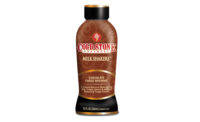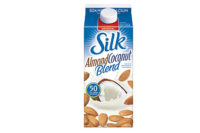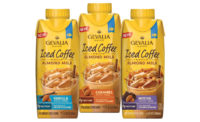Dairy alternative drinks are becoming so mainstream that they might soon deserve their own name, says David Sprinkle, research director and publisher of Packaged Facts, Rockville, Md. As opposed to an industry term that links directly to the dairy category, he suggests something more along the lines of “plant-based beverages.”
“[It] does not trip off the tongue, [and] I don’t see consumers picking that up, but conceptually that might be a better way of looking at it,” he says.
According to Chicago-based Mintel's April 2012 report "Dairy and Non-dairy Milk — US,” these milk substitutes make up 8 percent of the total U.S. dairy and non-dairy milk market. The market research firm also predicts that this segment will bring the highest growth to the market in the coming years.
Consumers often turn to dairy alternatives as they become aware of personal health issues, such as lactose intolerance, a milk allergy or phenylketonuria (PKU), or choose a vegan dietary lifestyle, according to Packaged Facts' “Dairy Alternative Beverages in the U.S.” report. Americans also are becoming more interested in healthy lifestyles and are turning to dairy alternative beverages for nutritional ingredients, such as vitamins, cholesterol-free content, vegetable protein and more, the report states.
Successful dairy alternative beverage sales also can be credited to the amount of shelf space these products receive in stores, says Agata Kaczanowska, beverage industry analyst at Santa Monica, Calif.-based IBISWorld. “You can see this in the grocery store when you walk in: The alternative dairy beverages are making up a larger shelf space … It’s really demonstrating how consumers are looking at these more and choosing to buy them more as well because stores are choosing to display them more,” she explains.
As part of this upward trend for dairy alternative beverages, the refrigerated milk substitutes market grew approximately 14.5 percent to more than $709 million in supermarkets, gas stations, convenience stores and mass merchandise outlets, excluding Walmart, for the 52 weeks ending Aug. 12, according to data from Chicago-based market research firm SymphonyIRI Group.
Broomfield, Colo.-based WhiteWave Foods’ Silk brand captured four of the Top 10 spots for most sales in the milk substitutes category, with Silk Original Soymilk topping the chart at more than
$190 million and Silk Pure Coconut, which was launched last year, coming in eighth overall.
Breaking down this trend even further, IBISWorld's report "Soy & Almond Milk Production in the U.S." states that the total dairy alternative beverage market is $1.5 billion, with soy milk making up 67.5 percent. Almond milk accounts for 21.5 percent of the market with rice milk at 7 percent, coconut milk at 2.5 percent, and other alternatives such as hemp, oat, hazelnut, flax, sunflower and multigrain milk making up the remaining 1.5 percent.
Although soy milk is still the king of the dairy alternatives segment, almond milk is the fast-est growing dairy alternative drink, growing
74 percent in food, drug and mass merchandise stores, excluding Walmart, from 2010 to 2011, Mintel reports. The market research firm attributes some of this growth to almond milk’s availability in half-gallon and gallon container sizes in the refrigerated section of stores, giving it a more visible shelf presence. In addition, Mintel reports that 75 percent of all milk buyers report buying any type of milk in gallon containers, making this packaging choice a successful move for almond milk.
A new almond milk product to store shelves this year is Eugene, Ore.-based Turtle Mountain’s So Delicious Almond Plus, which contains 5 grams of protein per serving. Fortified with pea and rice protein, Almond Plus’s Original and Vanilla varieties contain 8 grams of sugar in each serving as well as vitamins A, B12, C and D, calcium, folate, magnesium, iron, zinc, selenium and potassium. Almond Plus also is available in an Unsweetened variety, which contains no sugar.
Other more niche dairy alternative products also are making a statement on store shelves. Last fall, Pacific Foods of Oregon, Tualatin, Ore., launched Pacific Organic 7 Grain non-dairy beverages in Original and Vanilla varieties. Made with oat, brown rice, millet, spelt, wheat, triticale and barley, the beverage also is an excellent source of calcium, B vitamins and omega-3 fatty acids, the company says.
As innovation continues to expand the dairy alternative beverage market, Packaged Facts reports that popular dairy alternatives in other countries, such as quinoa, lupine, pea, peanut, cashew and sesame dairy alternative beverages, might also find their way to U.S. store shelves, giving consumers even more choices and creating even more competition in the marketplace.
Kefir catches up
Although soy milk and almond milk dominated the top of the dairy alternatives market, Morton Grove, Ill.-based Lifeway Foods’ Lifeway Original Kefir product snagged the No. 7 position on SymphonyIRI’s list of the top refrigerated kefirs, milk substitutes and soy milks with nearly a 12.5 percent increase in sales for almost $38 million in measured channels in the 52 weeks ending Aug. 12, SymphonyIRI reports.
Other noteworthy alternatives in the Top 20 include Lifeway’s Organic Kefir product line, which came in at the No. 12 position with a 19 percent increase in sales for just less than $4 million; Lifeway’s ProBugs Organic Kefir for kids at No. 18 with a 56 percent increase in sales for approximately $987,000; and Lifeway’s BioKefir product line following at No. 19 with an 82 percent increase in sales for approximately $880,000, SymphonyIRI reports. These successful market trends are reflected in Lifeway Foods’ second quarter 2012 results as well. The company’s gross sales increased 14 percent to $22.7 million, compared with $19.9 million for the second quarter of 2011, and gross profits increased 46 percent to $8 billion, compared with $5.5 billion in 2011, which the company attributes to the success of the ProBugs and BioKefir product lines.
“Our higher net sales combined with the benefit from lower milk prices and tightly controlled expenses enabled us to report a quarterly earnings increase of 650 percent, the strongest in our company’s history,” Lifeway Foods Chief Executive Officer Julie Smolyanski said in a statement.
The company also is positioning itself to expand even more by starting to offer its Starfruit Signature Smoothies with kefir, which previously were available only in the Chicago area, in Whole Foods cafés and other kiosk locations in the Boston area. Lifeway began distributing the smoothies as free samples at the Boston Marathon in April as well as at Earth Fest, also in Boston, in May. Starfruit Signature Smoothies also are available at the café inside the Whole Foods Wellesley store in Massachusetts.
Flavor and function
Flavor is the No. 1 motivator for buying a new product, Packaged Facts’ Sprinkle says. Therefore, it’s no surprise that more than one-third of American adults purchase refrigerated flavored milk beverages, which made up 6 percent of total U.S. dairy and non-dairy milk sales in 2011, for their households, according to a Mintel report.
The flavored milk segment totaled nearly $1.1 billion in the 52 weeks ending Aug. 12 in measured channels, with three different TruMoo chocolate milk brands from Dallas-based Dean Foods, which all launched last year, ranking on SymphonyIRI’s Top 10 list of flavored milk, eggnog and buttermilk drinks.
As demonstrated by the popularity of better-for-you milk drinks like TruMoo, consumers are expecting more than just flavor from their dairy drinks — they want health and wellness benefits, too. A growing body of research shows that low-fat chocolate milk — with its mix of carbohydrates and protein — helps build muscle fuel and can be used as a recovery drink after a workout, according to Nestlé USA’s Nesquik brand. The Glendale, Calif.-based company partnered with World Champion tennis playing brothers Mike and Bob Bryan this year to share a message about chocolate milk’s benefits.
“We drink it occasionally after a tough match, or a long practice, to help us with our physical recovery,” Mike Bryan said in a statement.
Beverage-makers have launched a number of better-for-you, ready-to-drink flavored milk and drinkable yogurt products this year. In March, Chicago-based Made Drinks Co. launched Charley’s Premium Milk, a ready-to-drink, shelf-stable, fat- and rBST-free flavored milk product. Containing 15 grams of protein in each serving, the product targets adults who want to use chocolate or strawberry milk as a recovery beverage. At the Natural Products Expo East in September in Baltimore, Skyland Foods, Washington D.C., debuted Ibex, a line of drinkable yogurts with functional health benefits. Ibex also is marketed to adults seeking on-the-go nutrition without sacrificing flavor and will be available in Pure&Simple (Original flavor), Probiotic (Ginger flavor), Brain Boost (Mint Melon flavor) and Recovery (Banana flavor) varieties in the coming months.
Flavored milk’s availability in convenient, portable packaging sizes enables it to be a popular on-the-go health beverage, says Suley Muratoglu, vice president of marketing and product management for Vernon Hills, Ill.-based Tetra Pak Inc. The availability of flavored milk in “portion packs” — 16-ounce packages and smaller — contributes to more than 40 percent of flavored milk sales, he says.
For further growth in the flavored dairy beverage segment, Mintel suggests that industry players experiment with functional flavors that could appeal to consumers in the 55 years old and older demographic, a group that thus far has shown declining interest in milk drinks. Functional flavors like dark chocolate with high amounts of antioxidants or functional enhancements like extra calcium and vitamin D for bone health, low or no sugar options, or high protein could be keys to further growth in this category, it says. BI
Shelf-stable solutions
To suit the on-the-go lifestyle of Americans, Vernon Hills, Ill.-based Tetra Pak offers shelf-stable on-the-go bottles for dairy and dairy alternative beverages. To spread the shelf stable milk story, the company launched its Milk Unleashed campaign to communicate to moms the convenience of shelf-stable milk products, which do not require refrigeration until opened, says Suley Muratoglu, vice president of marketing and product management for Vernon Hills, Ill.-based Tetra Pak Inc. Parents can toss the beverage containers into lunch bags or backpacks for a nutritious beverage for lunch or an on-the-go snack, he adds.
The shelf-stable milk goes through an ultra pasteurization process that eliminates bacteria in the milk. This product treatment combined with an eco-friendly Tetra Pak carton that keeps out light, air and harmful contaminants that could spoil the milk results in a product that lasts approximately six months without refrigeration or preservatives, the company says.
While shelf-stable milks are a staple in Europe and South America, such product use has been slower to catch on in the United States. “However, shelf safe milk is growing very quickly [in the U.S. now] as it offers the same milk with greater flexibility — it’s milk that you can drink anywhere, anytime, without concerns about product safety, quality or spoilage,” Muratoglu says. Major brands like Lala, Hershey’s, Borden, Horizon and Organic Valley all offer dairy beverages in shelf-stable packaging, the company says.
“We feel that shelf-stable milk will increase in the future,” says Michelle Hennessey, president of Metairie, La.-based Diversified Foods Inc., a company that markets Hershey’s milk products. “Because of our efforts and having a strong brand behind us, we continue to see sales rise. We look to the future with much optimism and will embrace the opportunities ahead of us with this product.”









